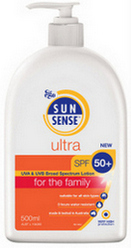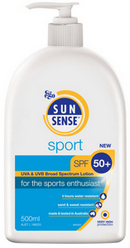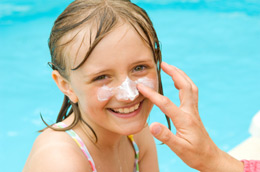Sunscreens
|
Sunscreens are chemical products which when applied to the skin in sufficient quantity and frequency provide some protection from UV radiation. They act by reducing the UV radiation, either through absorption, or reflectance. They should be considered as filters, rather than blockers, no sunscreen products provide 100% protection from UV radiation. Some protect only from UV-B radiation, whereas others protect the skin from both UV-B as well as UV-A, and these are known as broad spectrum sunscreens. The Sun Protection Factor, or SPF, is a measure of how effective a sunscreen is against UV-B radiation. SPF is determined in a laboratory. In general, the higher the rating, the longer it takes for the skin to become red. It is often stated that an SPF of 30 means that it takes 30 times longer for your skin to go red, however, this assumption is not reliable because it is dependent upon how much sunscreen is applied, what time of day it is, what time of year it is, your position in relation to the equator and whether you are sweating or swimming. Currently there is no internationally agreed test for measuring the UVA protection provided by sunscreens. Sunscreen should be applied at least 20-30 minutes before going outdoors. A common mistake is applying too little sunscreen, which will drastically reduce the effectiveness of the sunscreen. An average adult will need at least 30mL of sunscreen to cover the entire body. Sunscreen must be reapplied every two hours when staying outdoors for a prolonged period of time. People with sensitive skin who burn quickly should always apply a broad spectrum sunscreen with an SPF of 30 or more.
View the embedded image gallery online at:
https://www.skincancerclinics.net.au/prevention/sunscreens#sigProGalleria576322dd4d All people, including children, should apply a sunscreen to their face and hands each morning. This can be applied as part of a daily moisturising regime and will provide some protection against the damaging effects of the sun. Sunscreens are not just for sunny days at the beach during summer. It is important to remember to use sunscreens whenever you are outdoors for more than 20 minutes – this includes times when you are skiing in the snow and even on cloudy days. Ensure that sunscreens are not relied on as the sole protective measure against UV radiation. The most important factor is sun minimisation, and this is best achieved through seeking the shade and using sun protective clothing including a broad brimmed hat and sunglasses. |
|
What is Your Skin Cancer Risk?
Calculate your level of risk of developing a skin cancer from exposure to the sun.






